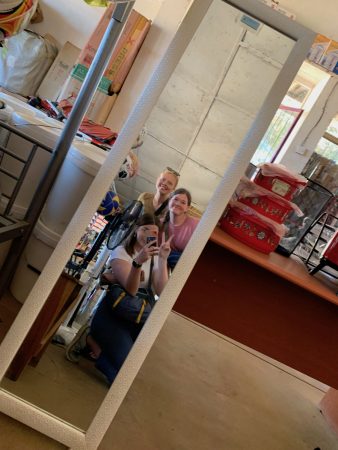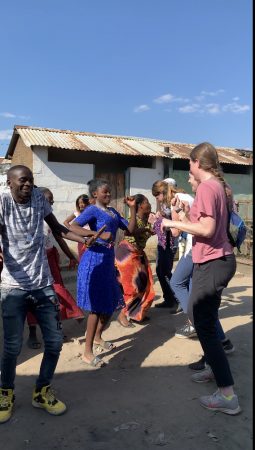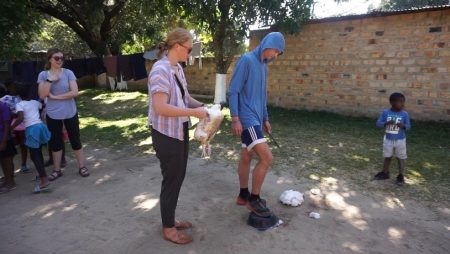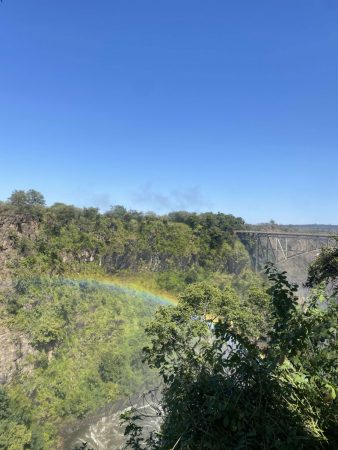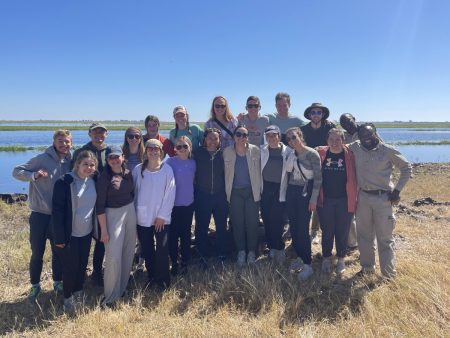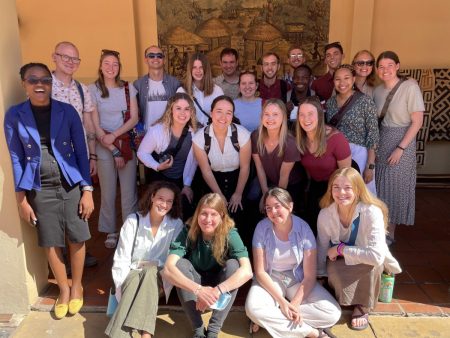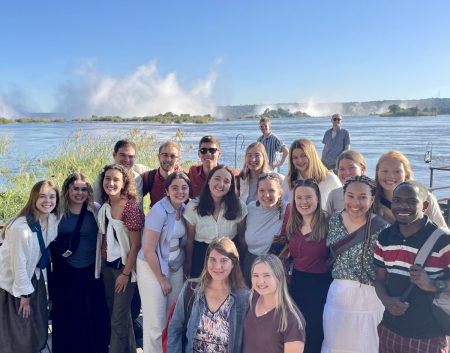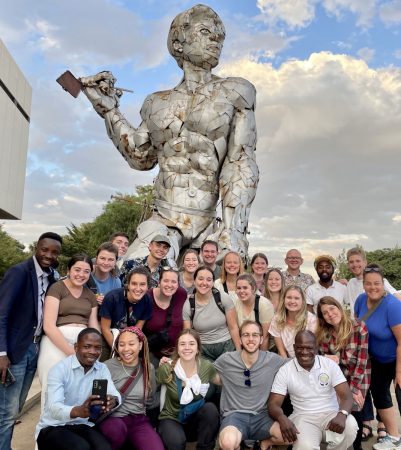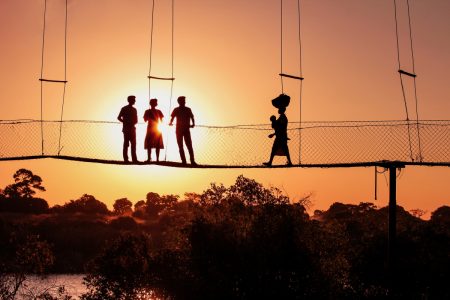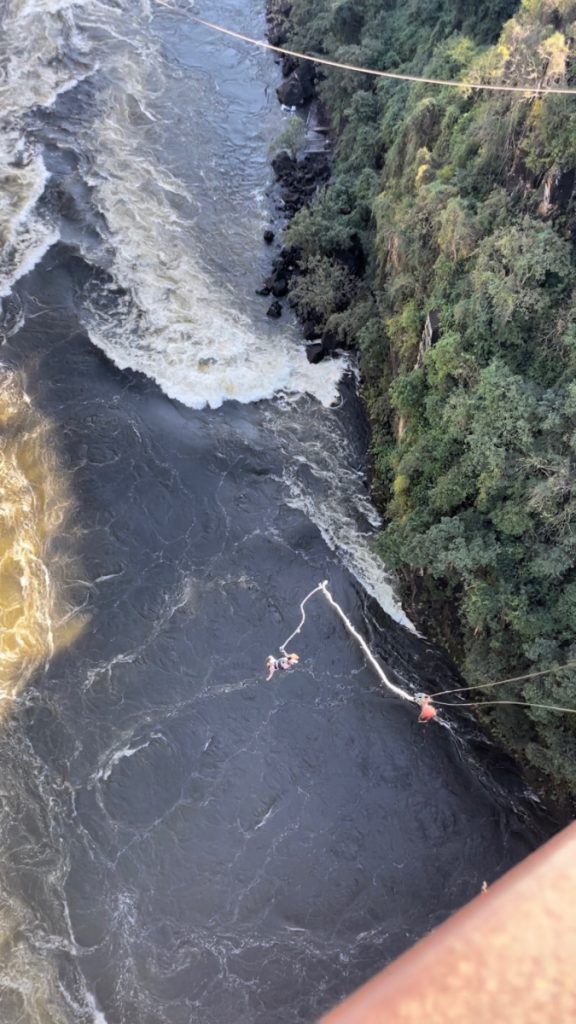
Chimene Mwane family, friends, alums, and other community members,
Our group is starting to settle into our routine here in Zambezi and our common spaces are coming alive with posters, affirmations, reflective pieces, and poems on the wall. And, of course, the joyful singing, dancing, and laughing that echoes from the kitchen from the rotating dish crew. This group of Zags has truly taken to heart what it means to form authentically deep relationships with ourselves and others – a reality for which I am immensely grateful.
When I began thinking about the topic of my blog, I felt unsure of where to start. How could I capture everything I have experienced? How could I honor the Zambezi community and do right by the people I have begun building relationships with? In unravelling these challenges, I realized that perhaps the best way to start is like any other event here in Zambezi, with a simple hello.
In his book In the Shelter, Pádraig Ó Tuama writes, “What is the name for the place where you now are? It requires close looking; it requires the dedication of observation and a commitment to truth. To name a place requires us to be in a place. It requires us to resist dreaming of where we should be and look around where we are. Hello to here. Hello to the name of here.”
Since the start of our time together back in January until now, and everything in between, I have said and received many hellos – some of which I am only beginning to unravel in their complexity. Each day, saying hello to here takes many new forms.
In Livingstone, I said hello to Victoria Falls, which is one of the most dramatic landscapes I have ever seen. Shortly after being soaked by the water, I said hello to the bungee jump of both thrill and fear that I took. As many Zambians and neighboring Zimbabweans told me, “Once you jump, it will feel like you have been born again.” As it turns out, they were correct. Somehow this 413-foot plumet reignited my spark for living a life of many leaps. Hello to being alive.
On Monday, the Computer Education Team and the ZamCity Team had the privilege of going to Zambezi Basic School. When we arrived, we were greeted by the deputy head teacher, Precious, who informed us that she would call an all-school assembly to welcome us and introduce us to the students. Five short minutes later, we walked out to approximately 1,700 smiling faces eager to learn our names. After introducing myself, I heard the students practicing: “autree…atree…tree.” Even though most of the students are unable to pronounce my name correctly, and even though there are occasional communicative barriers, the desire for these students to acknowledge us is abundant. Hello to the abundance.
I don’t think I have ever been in a place of such radical welcome. “Hello” extends far beyond a greeting here in Zambezi. It welcomes conversation, it invites curiosity, and it honors the humanity we each hold. I believe that people here are truly invested in meeting us, learning who we are, and building relationships with us. This is what accompaniment is all about.
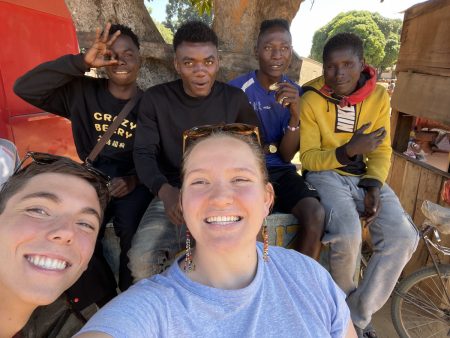
These relational hellos have also called me to reflect on my chosen vocation. As many of you know, I have wanted to be a teacher for my entire life and am only one short year away from graduating. As I near this place, I frequently consider the ways I will build relationships with my students. In my teacher preparation courses at Gonzaga, we often talk about the necessity of forming relationships with our students. A key distinction I have observed here in Zambezi compared to my experience in the United States, is that relationships are not compartmentalized here. Teachers and students interact frequently and live lives that are deeply intertwined and interdependent on each other. In the United States, it’s easy to leave relationships at the door once the school day is over. I am sure we have all had the somewhat awkward experience of seeing a teacher or professor at the grocery store and wondering if we should say hello. While I say this somewhat jokingly, there is also truth to it. I have not, however, witnessed this same thing in Zambezi. Likya, the teacher Eva and I are working with at the school, has well over 40 students in each of her classes. Without fail, she knows each of their names and is a master of her craft in kindly commanding attention of her pupils. I know that this ability stems from deep and mutual trust exhibited outside the classroom. Similarly, community members greet each other as brothers and sisters day in, and day out. It is beautiful.
Amidst the joys, there are also hellos to surprise and uncertainty. The first day we were here, Tyler and I were exploring the market and searching for chili powder (which we sadly were unable to find). Four men kept waving and beckoning us over to where they were standing. Truthfully, the first couple times they called out to us, the alarm bells that I have been conditioned to attend to started ringing. I am a woman. What do they want? Are they unsafe? What are my surroundings? After more calls however, we walked over. The first words out of their mouth were “Hi! Welcome to Zambezi. We want to greet you.” This hello was pivotal for me. It reminded me that every person has dignity and worth and it is our responsibility as a collective to honor this humanness in each other. It is this profound acknowledgement of a person’s humanity that I experienced when Christine, the great-grandmother of one of my computer students told me and Sarah that we could call her grandmother. Hello to my growing family of Mamas, grandmothers, friends, and students.
Thank you to all of you who are thinking about and praying for us. As we continue building relationships with this beautiful community, I encourage us all, Zags and friends, to greet a new experience, conversation, fear, or hope. Name it, and when you are ready, say hello.
Peace and blessings,
Audrey Buller ‘2023

